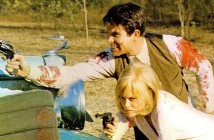
Editor’s Notes: 3 1/2 Minutes, 10 Bullets is currently out in limited theatrical release.
In the wake of yet another mass shooting, we’re reminded once again that in America, far too many people believe that a gun is the solution to their problems. Worse, they often believe that someone else’s religion, race, gender, or sexuality is their problem, or they can be set off by something as innocuous as an unfriending on Facebook. Having already decided that violence is the only proper response to any and all problems, tragedy is the inevitable result.
Silver had access to an incredible amount of footage and recordings, but the film works best when it goes directly to the sources.
Marc Silver’s latest documentary 3 1/2 Minutes, 10 Bullets revisits one recent example of this disturbing trend: the shooting of Jordan Davis, a black teenager, by Michael Dunn, a middle-aged white man. Dunn claimed that he asked Davis and his friends, who were sitting in a car in the parking lot of a quick shop, to turn down their music, but Davis became belligerent. Insisting that Davis pointed to a weapon in the car, Dunn went back to his own vehicle, grabbed a gun, and shot Davis several times, killing him. Dunn fled the scene.

Two days later, Dunn was arrested and charged with murder. No weapon was ever found in the teens’ car, yet the crux of Dunn’s defense was Florida’s now-infamous Stand Your Ground law: Dunn contended that even if he was mistaken, because he truly thought Davis had a weapon and that his own life was in danger, shooting Davis was justified.
Through interviews with Davis’ friends and family, including his determined but grieving parents, we get to know the kind of teenager Jordan Davis was. Yet 3 1/2 Minutes chooses to go nearly half an hour before we see the victim, a curious choice and one that is not entirely successful. The documentary doesn’t want your sympathy for Jordan just because of his young age or because he was a cute kid, which is understandable, but essentially disappearing the victim is troubling, and it causes a disconnect with an audience ready to make an emotional connection with the film. This leaves the audience searching for something to connect with, and most will find this connection in anger at the numerous astonishing, sometimes downright stupid, comments Dunn makes. He testifies, for instance, that he was afraid of the teens in part because their rap music included a lyric about “crackers.”
What we see in 3 1/2 Minutes is the result of cultural values that, when left unchecked, can lead to disaster.
Silver had access to an incredible amount of footage and recordings, but the film works best when it goes directly to the sources, talking with Jordan Davis’ parents, his girlfriend, and his high school friends, many of whom also appear on the witness stand. The courtroom footage is similarly compelling, especially when we get to see Dunn’s lawyer, as seedy as a character on a bad primetime cop show, in action. It’s frustrating to see the prosecution’s witnesses and experts react to him in such an unprofessional way, however, making faces that their mothers would tell them will freeze that way if they don’t cut it out.
3 1/2 Minutes is not interested in whether Stand Your Ground is an ethical law, or even whether our country needs to have a dialogue on gun control. Instead, what we see in 3 1/2 Minutes is the result of cultural values that, when left unchecked, can lead to disaster. The mere existence of a film like 3 1/2 Minutes, 10 Bullets, as well as the fact that so many similar incidents have happened since Jordan Davis was shot that this case, which was all over the media just three years ago, has already been nearly forgotten, should be enough make any rational person think long and hard about where we’re at as a society.
The mere existence of a film like 3 1/2 Minutes, 10 Bullets, as well as the fact that so many similar incidents have happened since Jordan Davis was shot that this case, which was all over the media just three years ago, has already been nearly forgotten, should be enough make any rational person think long and hard about where we're at as a society.



